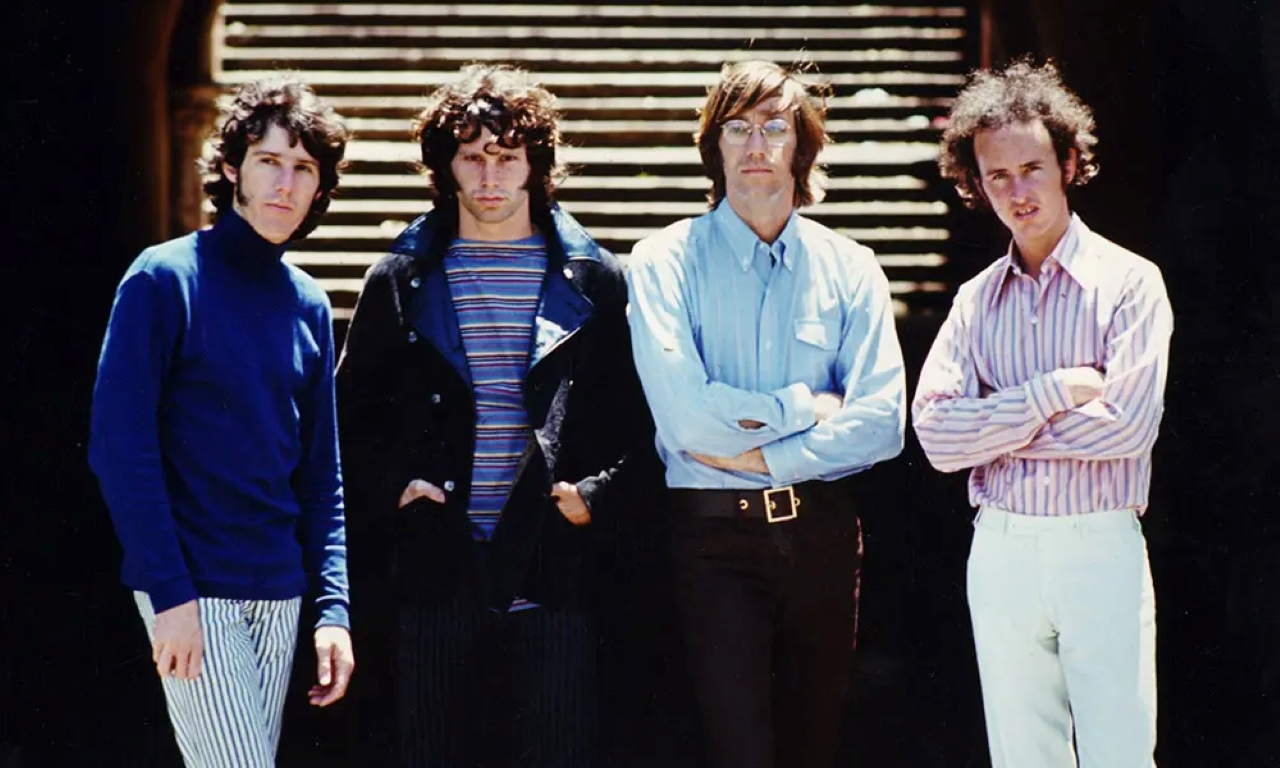🔥 The Moment The Doors Lit a Fire on TV
On July 22, 1967, millions of American teenagers sat in front of their televisions to watch American Bandstand, a Saturday afternoon staple of the ’60s. This was the show of clean-cut dancers, smiling pop stars, and harmless hits.
And then came The Doors.
Dressed in black, led by a soft-spoken frontman with a thousand-yard stare, they performed “Light My Fire.” It should have been just another appearance. But even in a format that scrubbed everything clean, Jim Morrison managed to smuggle in a spark.

📺 “American Bandstand” – Where Rebellion Meets Censorship
American Bandstand was known for taking raw musical acts and making them TV-ready. Performances were mimed. Interviews were short. Edges were softened. The show wasn’t about rebellion—it was about digestible youth culture.
But The Doors didn’t fit that mold. Their music was moody, poetic, and sometimes unnerving. Jim Morrison, often called the “Lizard King,” wasn’t the kind of star who played nice.
Which is what made their performance on Bandstand all the more surprising—and strangely iconic.
🎙️ Lip-Synced, but Not Sanitized
As was the norm for the show, The Doors mimed their performance. No live vocals. No long solos. Just the single version of “Light My Fire” playing while the band pretended to play along.
And yet, even in a staged environment, something felt… dangerous.
Jim Morrison barely moved. He didn’t smile. He sang with the detached cool of someone who didn’t belong in this glittery pop environment. He looked bored. Or maybe defiant. But he had everyone’s attention.
While other performers made eye contact with the camera, Morrison looked through it—like he knew something we didn’t.
🔥 “Light My Fire” – The Song That Changed Everything
Written by Doors guitarist Robby Krieger (with key contributions from Morrison and Ray Manzarek), “Light My Fire” was The Doors’ breakout hit. It reached #1 on the Billboard Hot 100, introduced a new kind of rock—psychedelic, sexual, cerebral—and turned Morrison into an unwilling teen idol.
The song combined poetic lyrics, Latin-tinged organ solos, and a simmering tension that set it apart from everything else on the radio.
But on Bandstand, that long instrumental break had to be cut. No seven-minute epic. Just a tidy, under-three-minute pop single.
Still, the fire remained.
🎤 The Interview: Short, Awkward, Revealing
After the performance, host Dick Clark did what he always did—he brought the band up for a quick, friendly chat.
Clark asked Morrison where he was from. Morrison replied quietly: “Florida.”
He asked where the band met. Morrison mumbled: “UCLA.”
There was no charm offensive. No excitement. Just the kind of quiet defiance that made viewers wonder what this guy was about.
He wasn’t rude. Just… out of place. And maybe that’s what made it so intriguing.
🌪️ A Calm Before the Storm
This was The Doors’ first major television appearance. It wouldn’t be their last—but it might have been their tamest.
Two months later, they’d perform on The Ed Sullivan Show, where Morrison famously ignored producers’ instructions and sang “Girl, we couldn’t get much higher” on live TV, causing chaos behind the scenes.
But on American Bandstand, he played by the rules—barely.
📻 The Power of Stillness
What’s remarkable about the Bandstand performance isn’t what happened. It’s what didn’t.
There was no wild behavior. No on-stage outburst. Just a man standing almost still, half-smiling, barely mouthing the words to a song that had already lit America on fire.
And yet, that calm made it more subversive. In a world of fake smiles and polished performances, Morrison’s stillness felt honest. Almost threatening.
It was a warning shot from a band that would soon become infamous for pushing every boundary imaginable.
🔚 The Doors Were Just Getting Started
The Bandstand performance of “Light My Fire” was a curious anomaly in the band’s chaotic journey. A flash of The Doors in a world that wasn’t quite ready for them.
But millions of young viewers were. And after that afternoon in July 1967, they weren’t going back to bubblegum pop.
They wanted fire.
And The Doors had only just begun to burn.